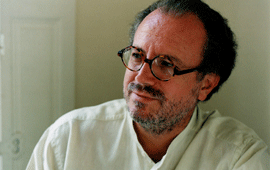> Interviews

Amaury du Closel on the 'Voix étouffées' Festival
Mister
Amaury du Closel, two days from now a new edition of the ‘Voix
étouffées’
Festival will begin. What are the objectives of this festival?
There are several. This year’s festival has three components: it begins with a conference that is centred on music in concentration camps, doubled by an exhibition that shows the role of music in Nazi camps and then a series of concerts where we will play works about this subject, as well as others that were based on the general theme, composers who were repressed or even eliminated during dictatorships. Thus we will show composers that were victims of the Nazi regime, of Stalinism or of other totalitarian regimes, such as that of the Greek colonels. A composition by Mikis Theodorakis will illustrate the latter. These would be the festival’s objectives. It is a unique initiative in the contemporary artistic world.
Who are the composers included
in these programmes and the performers that participate in the
festival?
We included German composers, such as Franz Schreker, Earn Stock, Russian composers who were victims of Stalinism, Alexander Mosolof, with a wonderful piano concerto from 1927-1928. Mosolof was deported in the Caucasus by Stalin. Then we have a concerto by Mieczylaw Weinberg, the great victim of the 20th century, blocked by two dictatorships. He ran away from Poland, when his family was destroyed by the Nazi, took shelter in the Soviet Union, and because he was a Jew he was arrested by Stalin during the darkest period of the Soviet Union. We have Walter Braunfels, a composition for violin, viola and chamber orchestra, Erwin Schulhoff. As we can see, it is a really varied group of composers, of extraordinary quality and inspiration. We have the privilege to collaborate with a French symphonic ensemble this year, the Strasbourg Philharmonic Orchestra, which joined us. This is a remarkable asset from an artistic and an institutional point of view. It is what we needed for the festival and it allows me to tackle a repertoire for orchestra, which was rather difficult before. We also have a Viennese ensemble, the Erstes Frauen-Kammerorchester von Österreich, who will interpret Arnold Schoenberg’s Transfigured Night, Weinberg’s Flute concerto and a composition by Erwin Schulhoff. There will also be a symphonic orchestra from Thessaloniki with a more chamber-like content, to interpret Mikis Theodorakis’ work, and we will also have other composers, such as Alexandre Tansman. We have also invited a flute ensemble, as well as the Psophos Quartet, who will play opuses by Viktor Ullmann, Schimun Lax, the conductor of the Nazi camp’s orchestra, and Béla Bartók, who was a victim of the Nazi regime in 1938.
All these landmarks should give you an overview of the festival taking place under the patronage of the Council of Europe. It represents the acknowledgment of our activity of over 10 years. The conference works will be published and thus you will know everything that occurs during the ‘Voix étouffées’ Festival.
Translated by Irina Borþoi and Elena Daniela Radu
MTTLC, The University of Bucharest














